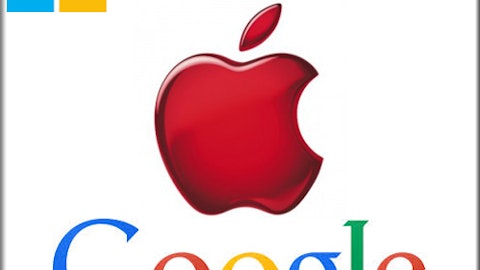Below we present the list of 5 Boring Stocks That Make Money. For our methodology and a more comprehensive list please see the 10 Boring Stocks That Make Money.
5. Crown Castle International Corp. (NYSE:CCI)
Number of Hedge Fund Shareholders: 48
Trailing 12 Month Net Income: $1.55 billion
Crown Castle International Corp. (NYSE:CCI) owns a bunch of (about 40,000) wireless communications towers which it then leases space on to its customers. It expected to grow revenue from those operations by 6% this year, nothing too exciting, but there long-term runway for the company is solid.
While the business model may be boring, the company’s penchant for making money isn’t, as evidenced by its $1.55 billion in TTM net income. Thanks to its steady stream of cash, Crown Castle also pays out a nice little dividend to shareholders, which yields close to 5%. The company plans to raise it by 7% to 8% annually over the long term.
Crown Castle International Corp. (NYSE:CCI) is hovering around five-year highs in terms of the number of hedge funds with long positions in the company. Ken Fisher’s Fisher Asset Management owns over 2.88 million CCI shares, while the Bill and Melinda Gates Foundation Trust, which is managed by Michael Larson, owns 1.42 million shares.
The ClearBridge Investments Global Infrastructure Income Strategy likes Crown Castle International Corp. (NYSE:CCI)’s opportunity in the 5G space, as outlined in its Q1 2022 investor letter:
“U.S. communications company Crown Castle International (NYSE:CCI) was the largest detractor from quarterly performance. Crown Castle is the leading independent owner and operator of wireless communications infrastructure in the U.S. with a portfolio of approximately 40,000 towers. The stock underperformed as, driven by rising interest rates, investors rotated away from defensive into more value-oriented sectors. Communications infrastructure remains attractive, however, as companies continue to deploy greater capital spend to support the strong tailwinds from 5G.”
4. Lowe’s Companies, Inc. (NYSE:LOW)
Number of Hedge Fund Shareholders: 53
Trailing 12 Month Net Income: $8.4 billion
Home improvement retailer Lowe’s Companies, Inc. (NYSE:LOW) probably won’t get many investors’ blood pumping, but the company has been a cash generating machine over the last few years, growing its net income more than three-fold and its earnings per share more than four-fold since 2019. In fact, the seller of nuts and bolts has the second-highest TTM net income of any of the boring stocks on this list. Due to weakness in the housing market, LOW shares have been hit pretty hard this year despite the company tracking for about the same performance as it managed last year, which is nothing to sneeze at.
Lowe’s Companies, Inc. (NYSE:LOW) ranked as one of the most popular stocks among hedge funds as recently as mid-2020, but hedge funds have been bailing on the stock since then. There’s been a 26% drop in ownership of LOW during the past two quarters alone. One of the company’s biggest bulls is Bill Ackman’s Pershing Square, which owns over 10.2 million shares to give it nearly 24% 13F exposure to the stock.
Ackman discussed some of the secular tailwinds he expects Lowe’s Companies, Inc. (NYSE:LOW) to benefit from over the long-term in Pershing Square’s Q2 2022 investor letter:
“Lowe’s Companies, Inc. (NYSE:LOW)’s is a high-quality business with significant long-term earnings growth potential underpinned by a superb management team that is successfully executing a multi-faceted business transformation.
COVID-19 was a transformational event for the US housing market, causing homeowners to invest significantly in their homes as they shifted nearly all their daily activities to the home environment, including work, school, and leisure. The increased use of the home during COVID, in turn, increased the need for repair, maintenance and remodel activity, which significantly benefited Lowe’s same-store sales. As consumers return to spending more time and money on out-of-the home activities the near-term demand for certain Do-It-Yourself (“DIY”) categories has decreased. Moderation in DIY demand combined with increased mortgage rates and decreased housing affordability has caused many market participants to become concerned that the home improvement industry may give up a significant part of their COVID pandemic sales gains.
While we expect that there will be some near-term volatility and continued moderation of DIY demand, growth remains strong for projects requiring professional installation (the “Pro” business) due to a substantial backlog of projects undertaken during COVID, which should support industry growth in the near-term. In addition, we believe the medium[1]term growth outlook for the home improvement industry remains strong as demand is likely to normalize at a materially higher level as compared to the pre-COVID era. For the decade prior to COVID, home improvement industry sales were notably depressed relative to their long-term averages as a percentage of overall consumer spend and GDP and have only now returned to their longer-term historical levels. Moreover, we believe COVID has permanently renewed consumers’ focus, appreciation, and utilization of their homes, which combined with higher home equity values, strong consumer balance sheets, low levels of home inventory for sale and an aging housing stock that requires an increasing level of maintenance, will likely result in a structurally higher level of ongoing home industry spending in the future. In the most recent quarter demand strengthened throughout the quarter as DIY consumers returned from summer vacations and focused on less seasonal home improvement projects…” (Click here to read the full text)
3. 3M Company (NYSE:MMM)
Number of Hedge Fund Shareholders: 54
Trailing 12 Month Net Income: $6.58 billion
3M Company (NYSE:MMM) has its hands in many pies, but the company is most known for producing Post-It notes, Scotch tape, and defective ear plugs. The company’s growth has been pretty tepid over the last few years and it’s currently embroiled in a potentially very costly legal battle over its aforementioned ear plugs. One thing the company does have going for it is its penchant for making money. It’s pulled in at least $4.57 billion in net income over each of the last four years.
Hedge fund ownership of 3M Company (NYSE:MMM) has jumped by 31% over the past two quarters to approach its all-time high. David Harding’s Wnton Capital built a new MMM stake during Q2, while Israel Englander’s Millennium Management raised its position by 72% during the quarter to 754,557 shares.
Mayar Capital recently bought back into 3M Company (NYSE:MMM) and discussed the company’s attractive revenue streams and margins in the fund’s Q2 2022 investor letter:
“We also bought back into 3M (NYSE:MMM) as the stock reached attractive levels. We’d sold our shares in 3M last year when the price exceeded our estimated fair value, and as better opportunities to invest in presented themselves at the time. Nonetheless, we’ve always liked this business with its diversified revenues, its R&D leadership and its stable margins.
2. Philip Morris International Inc. (NYSE:PM)
Number of Hedge Fund Shareholders: 56
Trailing 12 Month Net Income: $8.72 billion
Cigarette manufacturer Philip Morris International Inc. (NYSE:PM) probably operates in one of the least desirable markets in the world if growth is your thing, as the global tobacco market is contracting at a steady pace. Despite that, the company did grow revenue by nearly 10% last year thanks to growth in its selling of smoke-free and reduced-risk tobacco products, which are steadily pushing towards a 50% share of the company’s revenue. And one thing that isn’t in doubt is PM’s ability to make money, including over $9 billion in net income last year.
Hedge fund ownership of Philip Morris International Inc. (NYSE:PM) remained steady during Q2, with 56 money managers long the stock. Rajiv Jain’s GQG Partners owns the largest stake in PM as of June 30, consisting of over 30.4 million shares worth just over $3 billion. Several other funds have greater than 6% 13F portfolio exposure to Philip Morris.
Artisan Partners, which owns 1.2 million shares of Philip Morris International Inc. (NYSE:PM) as of June 30, discussed the company’s proposed takeover of Swedish Match in the fund’s Q2 2022 investor letter:
“On the positive side of the ledger, our top contributor was Swedish Match, a Swedish tobacco and nicotine products maker. The company received an all-cash takeover offer from rival Philip Morris International Inc. (NYSE:PM), which we also held in the portfolio, for SEK 106 per share—a 35% premium to Swedish Match’s prior closing share price. The deal is a good fit for PM as it reduces PM’s dependence on cigarettes—a category in steady decline—and accelerates the company’s transition to smokeless “reduced-risk” products (RRPs)—a category that has experienced rapid growth over the past five years. PM can also leverage its global scale to generate significant revenue synergies from these complementary product sets, as well as quickly gain access to the US market—the world’s largest market for RRPs and one where regulators have embraced RRPs and other less harmful nicotine products. We exited our position in Swedish Match as shares approached the takeout price.”
1. Costco Wholesale Corporation (NASDAQ:COST)
Number of Hedge Fund Shareholders: 64
Trailing 12 Month Net Income: $5.84 billion
Topping the list of boring stocks that make money is Costco Wholesale Corporation (NASDAQ:COST), another boring retailer that consistently makes a lot of money. Costco’s actually been in the midst of a pretty impressive growth period since the pandemic began, though that appears to be moderating now. It grew revenue by about 50% between 2018 and 2021, while EPS surged by 58% to $13.17. As inflation pressures consumers’ wallets, Costco is likely to become even more attractive to members and non-members alike given its refusal to raise prices on some items for the sake of margins. That makes it a great, if somewhat boring business in good economic times and bad.
There’s been an increase in the amount of hedge fund ownership of Costco Wholesale Corporation (NASDAQ:COST) for four straight quarters, with the number of smart money managers long COST rising by 16% during that time. Dmitry Balyasny’s Balyasny Asset Management built a stake in Costco during Q1, while Qing Li’s Sciencast Management did so during the fourth quarter of 2021.
The Cooper Investors Global Equities Fund is more bullish than ever on the strength of Costco Wholesale Corporation (NASDAQ:COST)’s buying power and the company’s growth runway, as detailed in the fund’s Q3 2022 investor letter:
“The US economy continues to run hot – the labour market is extremely tight and a number of executives we spoke to described their challenges in retaining staff and preventing competitors from poaching talent. Industrial companies in particular continue to see record backlogs, with the easing of logistics and supply chain constraints only just starting to have an impact on deliveries and lead times.
In terms of inflationary pressures, the vast majority of our holdings have been able to leverage strong market positions and stakeholder relationships to push pricing through in 2022 such that minimal impact to earnings has occurred. Clearly this is not a lever than can be pulled indefinitely but the more experienced management teams have kept some of their powder dry. Our meeting with management at Costco in Seattle was memorable for several reasons but one was their latent ability to increase member pricing which they have not done in over 5 years (and thus likely to do in 2023)…
…To conclude we’ll return to our meeting with Costco mentioned earlier. The business quality is no secret after decades of incredible execution, but the meeting gave us renewed conviction around Value Latencies in terms of the runway for growth, the focus on enhancing customer value, Costco’s vast buying power (it purchases 30% of the world’s jumbo cashews as one example) and management’s feral focus on the business model and cost discipline.”
For more of the latest stock picks worth considering for your portfolio, check out 10 Best TSX Stocks To Buy and 10 Best Global Dividend Stocks To Invest In.
Disclosure: None.





